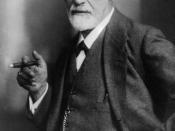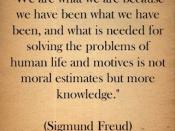Psychology
Introduction
What makes people think and behave the way they do? This question along with many others is answered by the science of psychology. Psychology has been around since the beginning of mankind but was not discovered until later. Psychology can be defined as the scientific study of mental processes and behavior (World Book Encyclopedia pg. 847). However, the exact definition has three different elements. The first states that psychology is a scientific enterprise that obtains knowledge through observation and research. The second element is psychologists study of behavior, which means any action or reaction that can be measured or observed. The last element is that psychologists study the mind, referring both conscious and unconscious mental states (Encarta online).
Psychology Questions
Many people think psychologists are people who help those with troubles or mental illness. However, this profession is more complex than that. Psychologists strive to understand the mysteries of human nature.
They ask questions and seek the answers to them. Some of the questions they ask are, "How do we hear, see, smell, taste and feel? What enables us to learn, think, and remember, and why do we forget? What activities distinguish human beings from other animals? What abilities are we born with, and which must we learn? How much does the mind affect the body, and how does the body affect the mind? What can our dreams tell us about our needs, wishes and desires? Why do we like the people we like? Why are some people shy and others aren't? What causes violence? What is mental illness, and how is it cured?" (World Book Pg. 847)
Research
The answers to these questions, along with many others, are found from specific kinds of research such as: observation, studies, looking for patterns, and predicting behavior. The first...


